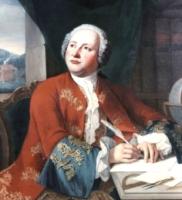| www.tmatlantic.com
Test & Soldering Equipment On-line Store |
|
D.E.V.I.C.E. (Wiki)Calculators Services |
|||||
Filter by first letter
|
Lomonosov, Mikhail
Mikhail Lomonosov was born on November 19, 1711. He was a Russian polymath, scientist and writer, who made important contributions to literature, education, and science. Among his discoveries were the atmosphere of Venus and the law of conservation of mass in chemical reactions. His spheres of science were natural science, chemistry, physics, mineralogy, history, art, philology, optical devices and others. The founder of modern geology, Lomonosov was also a poet and influenced the formation of the modern Russian literary language. Lomonosov was born in the village of Mishaninskaya, later renamed Lomonosovo in his honor, in Archangelgorod Governorate, on an island not far from Kholmogory, in the far north of Russia. Learning was young Lomonosov's passion. The boy's thirst for knowledge was insatiable. Lomonosov had been taught to read as a boy by his neighbor Ivan Shubny, and he spent every spare moment with his books. In 1724, intent on obtaining a higher education, which Lomonosov could not receive in Mishaninskaya, he was determined to leave the village. In 1730, determined to "study sciences," the 19-year-old Lomonosov walked all the way to Moscow. Shortly after arrival, he was admitted into the Slavic Greek Latin Academy by falsely claiming to be a son of a Kholmogory nobleman. In 1734 that initial falsehood, as well as another lie that he was the son of a priest, nearly got him expelled from the academy, but the investigation ended without severe consequences. In five years Lomonosov completed a twelve-year study course and in 1736, among 12 best graduates, was awarded a scholarship at the St. Petersburg Academy. He plunged into his studies and was rewarded with a four-year grant to study abroad, in Germany, first at the University of Marburg and then in Freiberg. Lomonosov quickly mastered the German language, and in addition to philosophy, seriously studied chemistry, discovered the works of 17th century Irish theologian and natural philosopher Robert Boyle, and even began writing poetry. Lomonosov returned to Russia in June 1741, after being abroad 4 years and 8 months. A year later he was named an Adjunct of the Russian Academy of Science in the physics department. Lomonosov was made a full member of the academy and named professor of chemistry in 1745. He established the academy's first chemistry laboratory. The idea of a coaxial rotor originated from Mikhail Lomonosov. In July 1754, he developed a model of a small helicopter with a coaxial rotor and demonstrated it to the Russian Academy of Sciences. In his genius enlightenments Mikhail Lomonosov was greatly ahead scientific concepts of his time. He died on April 15, 1765 in Saint Petersburg, at the age of 53. Citing www.wikipedia.org |
Site mapPrivacy policyTerms of Use & Store PoliciesHow to BuyShippingPayment




|

























